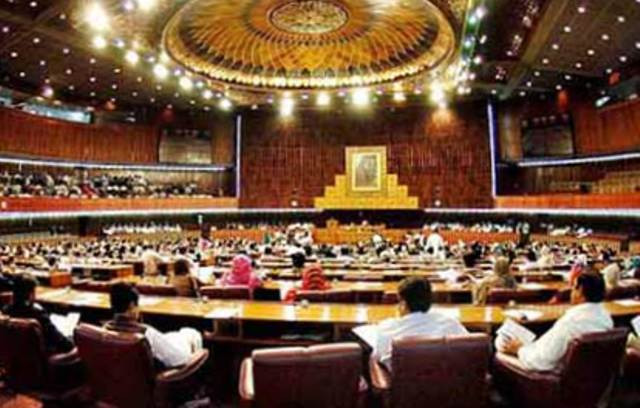National Assembly: Amendment bill on hold for increasing minority seats
Parliamentary panel report on controversial tax bill presented instead.

A file photo of National Assembly. PHOTO: APP/FILE
The government on Thursday dropped a constitutional amendment seeking an increase in the number of seats for minorities in Parliament and instead presented a report of the parliamentary panel on the controversial bill to amend tax laws.
The twenty-third amendment bill was on the agenda of the day but was not taken up once again, despite pledges from lawmakers, irking members of minorities in the lower house.
Akrman Masih Gill walked out from the session, questioning why the bill related to minorities’ affairs was not tabled first, despite assurances by the ruling and opposition parties. Other minority lawmakers backed the walkout.
Muttahida Qaumi Movement (MQM) instantly lashed out at the report, describing it as a scheme that provides blank amnesty to tax defaulters. MQM MNA Abul Rasheed Godil said that through this report, if one has been identified as a tax evader, they can wipe their slate clean by paying Rs40,000 for income or assets up to Rs5,000,000.
“Our party is against this bill because it was not presented before the committee clause by clause,” Godil said, adding that it will provide an opportunity for malpractice.
The report was presented by ruling Pakistan Peoples Party MNA Nafisa Shah, acting chairperson of the standing committee on finance, revenue, economic affairs, statistics, and planning and development. The government insists the amendment gives 3.8 million tax evaders a last chance to return to the tax net by paying a relatively small amount.
On Tuesday, the National Assembly Standing Committee on Finance and Revenue unanimously approved the changes. The bill will now be put to the lower house of Parliament for approval before the president signs it into law.
Under the scheme, tax evaders will be asked to pay the Rs40,000 or file an appeal within three months. The beneficiaries will have to file returns for four subsequent years. If hidden income or the asset’s value overshoots the five-million-rupee threshold, the evader will have to pay an additional 1% to 1.75%.
If the identified tax evaders do not use the scheme, their computerised national identity cards will be suspended for commercial transactions. Their bank accounts will be blocked and they will be barred from international travel.
It came down to a choice between catching the identified people in two years or bringing them in the tax net in two months and making them pay from here onwards, argued Federal Board of Revenue Chairman Ali Arshad Hakeem. According to him, all citizens with tax liabilities, barring the 300,000 serious tax evaders, are eligible. Holders of public office as defined in National Accountability Bureau Ordinance have been excluded from the list of beneficiaries.
Published in The Express Tribune, March 8th, 2013.



















COMMENTS
Comments are moderated and generally will be posted if they are on-topic and not abusive.
For more information, please see our Comments FAQ